|
|
|
Sort Order |
|
|
|
Items / Page
|
|
|
|
|
|
|
| Srl | Item |
| 1 |
ID:
160620
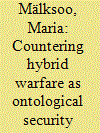

|
|
|
|
|
| Summary/Abstract |
What are the ethical pitfalls of countering hybrid warfare? This article proposes an ontological security-inspired reading of the EU and NATO’s engagement with hybrid threats. It illustrates how hybrid threat management collapses their daily security struggles into ontological security management exercise. This has major consequences for defining the threshold of an Article 5 attack and the related response for NATO, and the maintenance of a particular symbolic order and identity narrative for the EU. The institutionalisation of hybrid threat counteraction emerges as a routinisation strategy to cope with the “known unknowns”. Fostering resilience points at the problematic prospect of compromising the fuzzy distinction between politics and war: the logic of hybrid conflicts presumes that all politics could be reduced to a potential build-up phase for a full-blown confrontation. Efficient hybrid threat management faces the central paradox of militant democracy whereby the very attempt to defend democracy might harm it.
|
|
|
|
|
|
|
|
|
|
|
|
|
|
|
|
| 2 |
ID:
130988
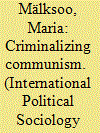

|
|
|
|
|
| Publication |
2014.
|
| Summary/Abstract |
The Eastern enlargement of the European Union has intensified calls for the reconstruction of a common European remembrance of the continent's multiple totalitarian legacies. Various political initiatives to condemn, along with counter-attempts to re-legitimize, the legacy of communism have emerged at the pan-European level. Each aspires to leave an imprint on the symbolic moral order and the legal regime of the broader European community. This article builds a conceptual framework for understanding the contestation of political and juridical regulation of the transnational remembrance of totalitarian communist regimes in Europe. Critically engaging the concept of cosmopolitanization of memory, it is argued that mnemonic identity in Europe is being transformed via new claims on "European memory." These claims are being made by various East European actors seeking recognition of the region's particular historical legacies as part of the pan-European normative verdict on twentieth-century totalitarianisms.
|
|
|
|
|
|
|
|
|
|
|
|
|
|
|
|
| 3 |
ID:
148299
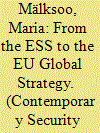

|
|
|
|
|
| Summary/Abstract |
Security strategies are important sites for narrating the EU into existence as a security actor. The unveiling of a new global strategy on foreign and security policy for the EU immediately post-Brexit could be conceived as a pledge to remain together as a Union for the purposes of contributing to global security in a particular way. This paper offers a brief stock-taking of the EU’s way of writing security from the European Security Strategy (2003) to the EU Global Strategy (2016). A concise exegesis of these documents exposes an interesting dynamic: as exercises in ordering the world, both strategic guidelines have turned out to be major exercises in ordering the self. The comparative snapshot shows the EU as increasingly anxious to prove its relevance for its own citizens, yet notably less confident about its actual convincingness as an ontological security framework for the EU’s constituent members over time.
|
|
|
|
|
|
|
|
|
|
|
|
|
|
|
|
| 4 |
ID:
092883
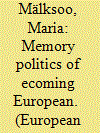

|
|
|
|
|
| Publication |
2009.
|
| Summary/Abstract |
The situation in collective memory studies that share a nexus with the discipline of International Relations (IR) is currently reflective of the traditionally West-centric writing of European history. This order of things has become increasingly challenged after the eastern enlargement of the European Union (EU). This article examines Poland's and the Baltics' recent attempts to enlarge the mnemonic vision of 'the united Europe' by placing their 'subaltern pasts' in contest with the conventionally Western European-bent understanding of the consequences of World War II in Europe. I argue that their endeavours to wrench the 'European mnemonical map' apart in order to become more congruent with the different historical experiences within the enlarged EU encapsulate the curious trademark of Polish and Baltic post-Cold War politics of becoming European: their combination of simultaneously seeking recognition from and resisting the hegemonic 'core European' narrative of what 'Europe' is all about.
|
|
|
|
|
|
|
|
|
|
|
|
|
|
|
|
| 5 |
ID:
180350
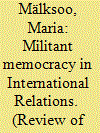

|
|
|
|
|
| Summary/Abstract |
This article theorises the nexus between mnemonical status anxiety and militant memory laws. Extending the understanding of status-seeking in international relations to the realm of historical memory, I argue that the quest for mnemonical recognition is a status struggle in an international social hierarchy of remembering constitutive events of the past. A typology of mnemopolitical status-seeking is presented on the example of Russia (mnemonical positionalism), Poland (mnemonical revisionism), and Ukraine (mnemonical self-emancipation). Memory laws provide a common instance of securing and/or improving a state's mnemonical standing in the relevant memory order. Drawing on the conceptual analogy of militant democracy, the article develops the notion militant memocracy, or the governance of historical memory through a dense network of prescribing and proscribing memory laws and policies. Similar to its militant democracy counterpart, militant memocracy is in danger of self-inflicted harm to the object of defence in the very effort to defend it: its precautionary and punitive measures resound rather than fix the state's mnemonical anxiety problem.
|
|
|
|
|
|
|
|
|
|
|
|
|
|
|
|
| 6 |
ID:
167603
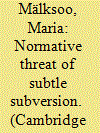

|
|
|
|
|
| Summary/Abstract |
A combination of undemocratic developments in Hungary and Poland as well as Eastern Europe’s reluctance to engage in solidary burden-sharing at the height of the refugee crisis in Europe has brought back familiar allusions of Eastern Europeans as troublemakers for European unity and peace. This article offers a discursive dissection of ‘Eastern Europe’ as a subtly subversive challenge to Europe’s security of ‘self’, entailing a fear of being overrun by an ‘other’ perceived as endangering one’s normative and cultural order. Proceeding from Ingrid Creppell’s (2011Creppell, Ingrid (2011) ‘The concept of normative threat’, International Theory, 3:3, 450–487
[Crossref], [Web of Science ®] , [Google Scholar]
) notion of normative threat, this article argues that the reappearance of ‘Eastern Europe’ as an ontological insecurity trope is indicative of deeper anxieties within Europe, some of which are systemic (such as doubts about the efficacy of integration and the legitimacy of the European Union) and some of which are contingent (such as concerns about defending the European political order from populist upsurges amidst ‘resurgent nationalism’).
|
|
|
|
|
|
|
|
|
|
|
|
|
|
|
|
| 7 |
ID:
174706
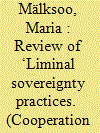

|
|
|
|
|
| Summary/Abstract |
The online publication of the article ‘Liminal sovereignty practices: Rethinking the inside/outside dichotomy’ moves away from the standard depiction of sovereignty as operating on the line between the inside and the outside of the state (Loh and Heiskanen, 2020). The authors seek to reconceptualize the said dividing line (border line) as a liminal space (border space) and, by extension, theorize the concept of liminality in greater depth and nuance. Sovereignty is accordingly taken to be grounded in three distinct spaces (the domestic society, the international realm and the liminal space between the two), loaded with various sovereignty practices. Liminality is theorized as an attribute of sovereignty. The authors offer a systematization of various ambiguous types of ‘borderline’ sovereignty, contesting the standard notions and practices of sovereignty to varying degrees. The article distinguishes between four distinct kinds of liminality: marginal (e.g., contested states); hybrid (e.g., indigenous peoples/tribal sovereignty); interstitial (e.g., non-state actors); and external (e.g., terrorists and anarchists) liminality – each with unique actors, practices and consequences for the concept of sovereignty.
|
|
|
|
|
|
|
|
|
|
|
|
|
|
|
|
| 8 |
ID:
168398
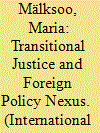

|
|
|
|
|
| Summary/Abstract |
How does an approach towards transitional justice produce preconditions for a country's international action, enabling certain policies and practices in the immediate neighborhood and international society at large? This article unpacks ontological security-seeking as a generic social mechanism in international politics, which makes it possible to productively conceptualize the connection between a state's transitional justice and foreign policies. Going beyond the dichotomy of transitional justice compliance and noncompliance by gauging the role of states’ subjective sense of self in driving their behavior, I develop an analytical framework to explain how state ontological security-seeking relates to major transitions and consequent state identity disjuncture, the ensuing politics of truth-and-justice-seeking, and its international resonance in framing and executing particular foreign policies. I offer a typology of the international consequences of states’ transitional justice politics, distinguishing between reflective and mnemonical security-oriented approaches, spawning cooperative and conflictual foreign policy behavior, respectively. The empirical purchase of the purported nexus is illustrated with the example of post-Soviet Russia's limited politics of accountability toward the repressions of its antecedent regime and its increasingly self-assertive and confrontational stance in contemporary international politics.
|
|
|
|
|
|
|
|
|
|
|
|
|
|
|
|
|
|
|
|
|